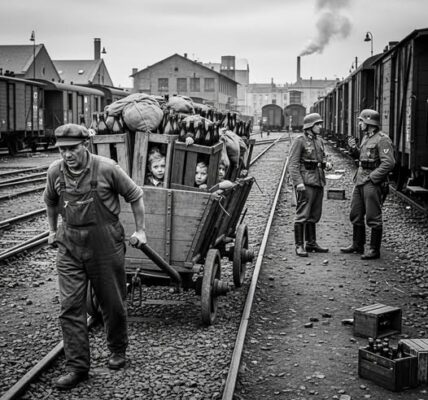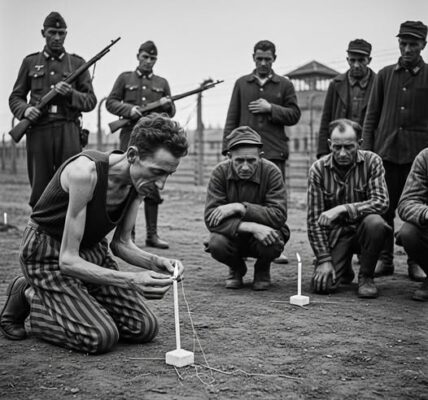Anna’s Return to Prague: A Survivor Facing the Ruins of Memory

The train entered the station with a metallic creak, its battered carriages still vibrating from the jolts of the road. The convoy seemed to bear the wounds of war within its walls, as if every bolt, every chip of peeling paint had absorbed the cries and silences of years past. On the platform, the air was saturated with coal smoke and the smell of iron and sweat that is always present around train stations. But that morning in Prague, in the spring of 1945, the station became the scene of an even more moving spectacle: the return of the survivors.
Among them, a woman hesitantly got off. Her name was Anna. A former seamstress, torn from her home and her job in 1941, she had known the sealed wagons of deportation, the concentration camp universe where the days were alike, marked by hunger, fear, and loss. She now wore heavy wooden clogs, much too big for her, which slapped against the platform with a dry sound. In her thin arms, she clutched a bundle of clothes donated by the Red Cross, the only barrier between her skin and the cold that persisted despite the return of spring.
Around her, the chaos of a city welcoming its surviving children mingled with the pleas of soldiers and the tears of families. Crates of food were hastily unloaded, blankets were piled in heaps on suitcases, and in the tumult, voices called out names. Each syllable thrown into the air was a prayer, a desperate attempt to invoke those the camps had swallowed up. The survivors of the Holocaust, emaciated and haggard, stepped off the train like shadows returned from hell, and the living who waited for them tried to recognize behind these ravaged faces the familiar features of a brother, a mother, a friend.
Anna, however, didn’t move. Her eyes, hollowed out by years of deprivation, drifted beyond the tumult, beyond the station, to rest on the dark spires of Týn Church, rising proudly against the Prague skyline. That Gothic silhouette, which she had kept deep inside her like a fragile talisman, now seemed real to her. Every hungry night, every icy morning behind the barbed wire, she had closed her eyes and thought of this city, its cobblestones, its red roofs. She had carried it within her like a promise of return.

But this return, she already knew, would not be the one she had so dreamed of. For the faces she longed to see again were not there. No one was waiting for her on the platform. No one was shouting her name in the din of broken reunions. The silence of her absence became heavier than the surrounding hubbub.
So, slowly, Anna left the platform. Her footsteps echoed strangely in her oversized clogs, as if each step bore the weight of memory. She walked through the streets of Prague, streets where every cobblestone seemed to hold the memory of a bygone era. The baroque facades and gleaming shop windows contrasted with her ghostly appearance. Passersby looked at her, some with pity, others with embarrassment, then looked away. To them, this woman with the shaved head and hollow cheeks was nothing more than a ghost returned from a world they preferred not to face.
Anna stopped in front of a shop window. Behind the glass, fabrics were carefully folded, elegant dresses hung, as if to taunt the seamstress she had once been. She looked up and met her reflection. The image reflected back to her in the mirror was not the one she remembered. That marked face, those eyes too old for her age, that frail, sickly figure no longer belonged to the Anna of before. She remained motionless for a moment, hypnotized by this stranger she discovered in the glass.
But suddenly, the city bells began to ring. Bells of peace, bells of survival, echoing throughout the Czech capital. It was the first time she had heard their chime in years. These sounds were not just notes, but a declaration: the war was over. So Anna leaned toward the windowpane, brushed her fingertips against the coldness of the glass, and whispered softly to the foreign reflection,
“I’m back. I’m still here.”
The ordeal of a return without roots
For many survivors of World War II, returning home was not a relief. Many, like Anna, returned to find their homes occupied, their families gone, their communities destroyed. The Holocaust had left behind a vast void, a gaping wound that neither time nor military victories could fill.
In Prague, the story was similar to that of Warsaw, Budapest, and Vienna: survivors wandered the familiar yet unfamiliar streets, searching in vain for a familiar face. Records show that more than 70,000 Jews from Bohemia and Moravia were deported, and barely 10,000 returned. These cold, implacable figures are echoed in the silence that surrounded Anna as she stepped off the train.
The return of the deportees posed a terrible question: how to tell the unspeakable? In a Europe weary from six years of war, the stories of the concentration camps seemed unreal. Many refused to listen. The survivors, however, carried within them images impossible to share: the noise of the train cars, the smell of the ovens, the screams of mothers torn from their children. Thus, many survivors found themselves isolated, strangers in their own country.
Anna experienced this from her first steps in the city. She heard the conversations around her, spoke to those she passed, but often received awkward silences. Her return was disturbing: it reminded everyone of what they hadn’t experienced, what they hadn’t prevented.
Yet surviving was itself an act of resistance. Every breath, every step through the streets of Prague was a victory over those who had sought to erase her. Anna knew this. When she spoke those simple words in front of the window—”I have returned”—she was speaking not just to her reflection, but to the entire world. Her survival became a living testimony, irrefutable proof against oblivion.

Over time, Anna returned to her craft as a seamstress. Her fingers, despite her thinness, regained the agility needed to sew and reshape the fabric. Her dresses carried within them an extra soul: they were not just clothes, but an affirmation of life, of regained dignity. Each stitch sewn was a response to years of humiliation.
Today, Anna’s story is part of the larger story of Holocaust survivors. She reminds us that returning home from the concentration camps did not mean the end of the ordeal. The hardest part then began: living with the memories, rebuilding a vanished world, and passing it on to those who had not seen it.
Prague train station, oversized clogs, the reflection in a shop window: so many symbols that tell, better than numbers, the pain and strength of the survivors.
And in this whisper addressed to her image – “I have returned” – still resounds today the voice of all those who, despite death, despite horror, have found the courage to live.



